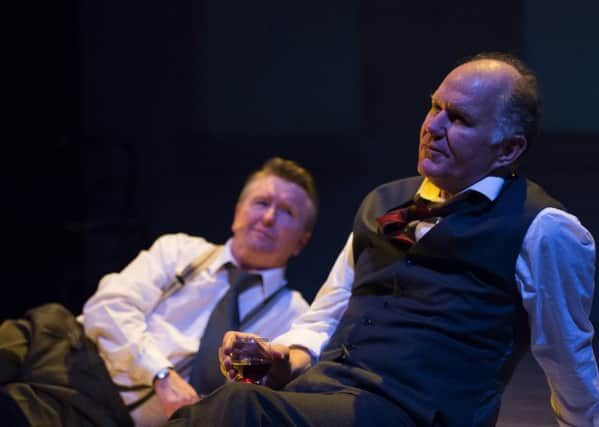Theatre review: Democracy, Stirling | Mungo Park, Edinburgh


It’s an ill wind that blows no good; and one unintended consequence of Brexit might be that we stop taking the peaceful western Europe we live in for granted, and start to examine its recent history more closely.
If so, Michael Frayn’s 2003 play Democracy should surely be one of our guiding texts. Overlong at a full three hours, slightly rambling in structure, and inclined to repeat itself, it’s still a fascinating study of one of the great turning points of the last 50 years – the moment in 1969 when West Germany elected Willy Brandt as its first social-democratic Chancellor since the Second World War, and he began that long rapprochement with the east that helped lay the ground for the fall of the Berlin Wall and the reunification of Germany, 20 years later.
Advertisement
Hide AdThe point of Frayn’s drama is to explore Brandt’s remarkable relationship with his personal assistant Gunter Guillaume, an East German spy at the heart of the Chancellor’s office. It’s clear from the outset, though, that Frayn sees this division in Germany as something more like a family argument than a stark East-West divide.
Brandt and Guillaume are both men of the German left. Brandt himself took on many names and identities, in his long flight from Nazism; and when he is told of Guillaume’s links to East Germany, he hardly seems to care, or to judge.
Michael Emans’s new large-scale touring production, for Rapture Theatre, faithfully follows all the winding pathways of Frayn’s drama, rather than imposing a firm pace and shape on it. It demands a great deal of concentration and some prior interest in the subject, and seems tentative and under-rehearsed in places, yet it boasts a formidable central performance from Tom Hodgkins as Brandt, with Neil Caple in eager support as Guillaume.
And if the rest of the all-male cast of ten sometimes look uncomfortable – required to deliver a brief cameo of a senior politician in a suit, or to deal with the antediluvian gender politics of an age when women featured in politics only as casual lovers on a campaign train – Frayn’s play still commands attention, with the energy and authority of its writing; not so much about democracy, perhaps, as about trust, and about a leader great enough to grasp that to build a new future, we need to act as if we trust everyone – even those who betray us, time and time again.
• Theatre Royal, Glasgow, 6-10 September; King’s Theatre, Edinburgh, 29 September-1 October; then touring until 12 October.
Mungo Park – Travels In The Interior Of Africa | Rating: *** | Summerhall, Edinburgh
Advertisement
Hide AdAs Matthew Zajac of Dogstar and his two fellow-performers in this Scottish-Danish co-production acknowledge from the start, the story of the quiet man from Selkirk who became one of Britain’s greatest explorers has all the qualities of an epic film.
Inviting the audience to view the early life of Mungo Park first in sweeping long-shot and then in close-up, they therefore set about telling the story in a style that involves imagination rather than naturalism, using simple dressing-up-box wigs, and a certain pantomime boldness of approach, in conjuring up the various Selkirkshire neighbours, establishment figures and African potentates Mungo meets along the way.
Advertisement
Hide AdThe underlying subject is a serious one, of course. At the time of Park’s expeditions, between 1794 and 1806, the west European powers were not only eager to get their hands on the vast rumoured gold-based wealth of West Africa, but were still earnestly debating whether black Africans could be regarded as human or not.
Mungo believed that they could; a belief which carried him a long way into the heart of Africa, making voluminous notes as he went. In the end, though, his journey reached a tragic climax.
And if the cartoon style of this production often fails to capture the full significance of the subject, Zajac still handles these final scenes with an emotional weight and energy that leaves a deep impression on the audience, and opens up a vital area of Scottish and world history, still far too little understood.
• Birnam Arts & Conference Centre today; Carlops Village Hall, 5 September, then touring until 25 September: www.dogstartheatre co.uk